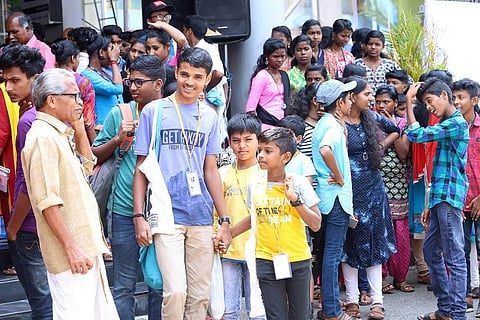

When she opens the blue lunch box, it is a burger inside. She looks from that to the two homeless children loitering outside the gate. It is lunch break at her school and she watches the other kids empty their half-finished lunches into the dustbin, inches away from the two homeless children, who are looking famished. She is the last to come back to her class after the lunch break, she doesn’t answer the teacher who asks her what kept her away. But there is a smile on her face, shared by two children now walking away from the school gates, a burger in their hands.
Thammanna Sol’s short film Lunch Break, described above, is less than four minutes long. And it is hard to believe a seventh grader directed, written, edited and did the cinematography of the film. The inspiration comes from her photographer dad, she says, sitting at the venue of the second International Children’s Film Festival of Kerala in Thiruvananthapuram. Her film, along with four others, is part of the competition category of the fest organised by the Kerala State Council for Child Welfare.
Thammanna (middle) with friends
A child delegate asks Thammanna if she needed a long time to plan the film and Thammanna says no, it was planned on a Friday and shot on a Monday, submitted the next day. “I want films to be real,” she speaks like an experienced filmmaker, sitting next to veteran theatre artiste and director Anil Parakkad whose film Balapadangal is also in the competition category.
Anil says that Balapadangal is against the superstitions that are fed to little children, who then grow up rooted in them. “I go to schools and colleges to conduct classes against superstitions. Even now you read such shocking stories in the newspapers, father killing child as sacrifice and so on. I think the fight against these evils should begin from children, reach them young.”
The competition films come with pretty strong themes. Devukrishna S Nath’s U Turn to the Nature is a short documentary on the use of organic vegetables, and against the idea of depending on farm products from other states. “We depend so much on vegetables – poisoned ones – coming from other states when we can farm them on our housetops, on terraces,” she says. Devu’s house has farms on the terrace and in the front yard. “The three of us – dad, mom and I – can have our food just from these vegetables that we farm.”
Devukrishna S Nath
A twelfth grader at Carmel School, Thiruvananthapuram, Devu also speaks against eating too much junk food, which children her age seem addicted to. “It will lead to so many health issues,” she speaks like a concerned citizen. But then this is the girl who directed her first documentary when she was in the fourth grade – Love Plastic – which was about reusing (one of the three Rs, she explains) plastics without discarding them. She’s also made another documentary called Nellinte Katha.
The other two short films in the competition category are Haritham and Munnariyippu. “Children today are up to date with the techniques of filmmaking. Not just the ones who make the films but those who watch too, and then ask very intelligent questions,” says Deepak SP, secretary of KSCCW. More than 3,600 children have registered as delegates this time and by the end of the seven-day festival, they would be making a film of their own, with some training. There are also celebrities visiting the fest, interacting with the children. On Sunday, actor Shane Nigam danced as the children sang. The festival ends on May 16.